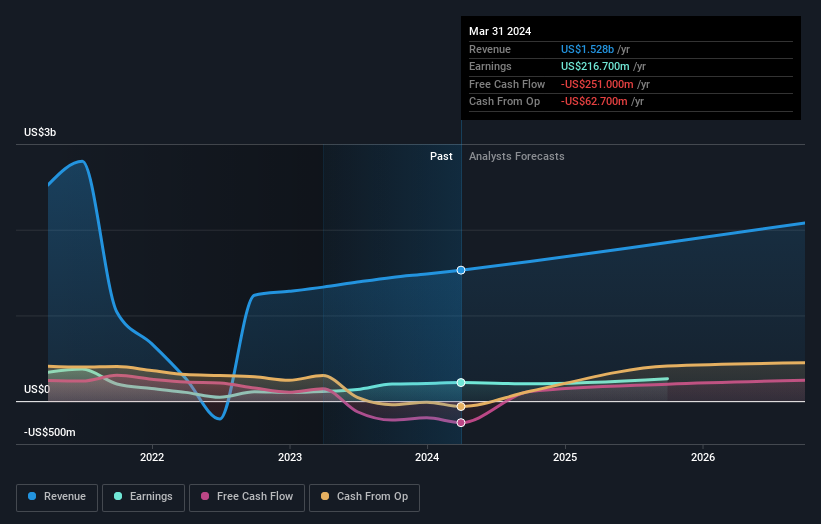While Valvoline Inc. (NYSE:VVV) might not have the largest market cap around , it received a lot of attention from a substantial price movement on the NYSE over the last few months, increasing to US$44.99 at one point, and dropping to the lows of US$39.54. Some share price movements can give investors a better opportunity to enter into the stock, and potentially buy at a lower price. A question to answer is whether Valvoline's current trading price of US$41.21 reflective of the actual value of the mid-cap? Or is it currently undervalued, providing us with the opportunity to buy? Let’s take a look at Valvoline’s outlook and value based on the most recent financial data to see if there are any catalysts for a price change.
See our latest analysis for Valvoline
What Is Valvoline Worth?
According to our valuation model, Valvoline seems to be fairly priced at around 0.10% above our intrinsic value, which means if you buy Valvoline today, you’d be paying a relatively reasonable price for it. And if you believe that the stock is really worth $41.17, then there isn’t really any room for the share price grow beyond what it’s currently trading. Although, there may be an opportunity to buy in the future. This is because Valvoline’s beta (a measure of share price volatility) is high, meaning its price movements will be exaggerated relative to the rest of the market. If the market is bearish, the company’s shares will likely fall by more than the rest of the market, providing a prime buying opportunity.
What kind of growth will Valvoline generate?

Future outlook is an important aspect when you’re looking at buying a stock, especially if you are an investor looking for growth in your portfolio. Although value investors would argue that it’s the intrinsic value relative to the price that matter the most, a more compelling investment thesis would be high growth potential at a cheap price. However, with a relatively muted profit growth of 7.1% expected over the next year, growth doesn’t seem like a key driver for a buy decision for Valvoline, at least in the short term.
What This Means For You
Are you a shareholder? VVV’s future growth appears to have been factored into the current share price, with shares trading around its fair value. However, there are also other important factors which we haven’t considered today, such as the track record of its management team. Have these factors changed since the last time you looked at the stock? Will you have enough conviction to buy should the price fluctuates below the true value?
Are you a potential investor? If you’ve been keeping an eye on VVV, now may not be the most optimal time to buy, given it is trading around its fair value. However, the positive outlook means it’s worth further examining other factors such as the strength of its balance sheet, in order to take advantage of the next price drop.
In light of this, if you'd like to do more analysis on the company, it's vital to be informed of the risks involved. In terms of investment risks, we've identified 2 warning signs with Valvoline, and understanding these should be part of your investment process.
If you are no longer interested in Valvoline, you can use our free platform to see our list of over 50 other stocks with a high growth potential.
New: Manage All Your Stock Portfolios in One Place
We've created the ultimate portfolio companion for stock investors, and it's free.
• Connect an unlimited number of Portfolios and see your total in one currency
• Be alerted to new Warning Signs or Risks via email or mobile
• Track the Fair Value of your stocks
Have feedback on this article? Concerned about the content? Get in touch with us directly. Alternatively, email editorial-team (at) simplywallst.com.
This article by Simply Wall St is general in nature. We provide commentary based on historical data and analyst forecasts only using an unbiased methodology and our articles are not intended to be financial advice. It does not constitute a recommendation to buy or sell any stock, and does not take account of your objectives, or your financial situation. We aim to bring you long-term focused analysis driven by fundamental data. Note that our analysis may not factor in the latest price-sensitive company announcements or qualitative material. Simply Wall St has no position in any stocks mentioned.
Have feedback on this article? Concerned about the content? Get in touch with us directly. Alternatively, email editorial-team@simplywallst.com
About NYSE:VVV
Valvoline
Provides automotive preventive maintenance through its retail stores in the United States and Canada.
Moderate growth potential with mediocre balance sheet.
Similar Companies
Market Insights
Community Narratives


Recently Updated Narratives

Early mover in a fast growing industry. Likely to experience share price volatility as they scale


Near zero debt, Japan centric focus provides future growth

TAV Havalimanlari Holding will fly high with 25.68% revenue growth
Popular Narratives


MicroVision will explode future revenue by 380.37% with a vision towards success


The company that turned a verb into a global necessity and basically runs the modern internet, digital ads, smartphones, maps, and AI.



